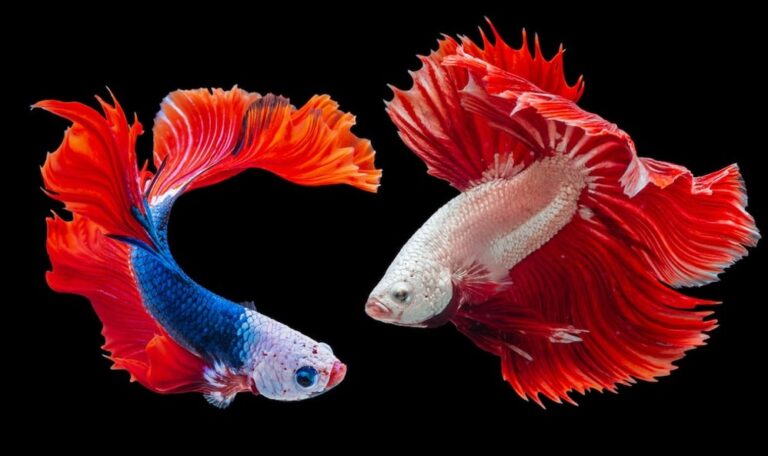Feeding turtles with a proper diet is essential to maintain their health. And when we talk about turtle diet, a combo of proteins and vegetables is crucial at the optimal level. While access to vegetables is easy, sometimes finding the right protein source can be hectic.
So, turtle owners sometimes look for natural protein sources and thus opt for the feeder fish for turtles. To speak the truth, feeder fish is worldwide popular among the turtle owners. But do you know the shocking truth behind feeder fish?
Yes, feeder fish are inexpensive and easy to cultivate, but these fishes can sometimes be lethal for your pet! It happens especially if you fail to pick the right feeder fish for your turtles. So, today we are going to describe the benefits and harmfulness of feeder fish. We will also bring forth how to bypass these disadvantages and maximize the benefits.
What Is Feeder Fish?
Although most turtle and pet owners should be familiar with the term, here’s a quick recap. It is a common name given to a specific group of inexpensive fishes. The fish group is readily available, and so, pet owners prefer them as a natural protein source for their pets such as turtles and sharks.
The most common feeder fishes are goldfish and guppies.

The usefulness of feeder fish
The fish breeds that are mostly used as feeder fish are some of the easiest and widely found fish for rearing and breeding. These fish groups will live and grow up in an overcrowded pond or tank. Moreover, the fish group is famous for its rapid growth rate and its high fecundity.
All these facilities help the pet owners to either rear or buy the feeder fish at an affordable cost for their pets. Especially, turtle owners choose the feeder fish because turtles will accept the fish quickly as an alternative food source than other food items. Some also believe that feeder fish are high in protein that helps their pet turtle grow better.
Then some turtle lovers believe that treating turtles with feeder fish helps to stimulate their wild instincts that would otherwise get lost. It also helps the turtles to exercise their predatory skills.
Dangers with the Feeder Fish
Despite having such benefits of feeder fish, likewise, every other thing, it’s not free from the negatives either.
One such drawback of feeder fish that sometimes it can be lethal for turtles, especially the bony fishes. The spine bones of fish, such as goldfish, are particularly tricky for the turtle to consume. It happens because the turtle doesn’t gallop fish as a whole. Instead, they bite, crush, and then eat the fish.
And as they bite, the spinal bones of goldfish may sometimes cause havoc to the throat. And in rare cases, if not swollen well, it may damage the intestinal system of the turtles. This throat damage will be most likely to happen if the feeder fish is too large.
So, supply the turtles with small feeder fish that they can consume in one or two gulps.
Feeder fishes are often unhealthy
One of the worst and also most dangerous things you can do to your turtles is the regular supply of feeder fish. These fish items in the majority of the cases contain a high amount of fat. Goldfish is an excellent example of this.
Sadly, most turtle owners are genuinely unaware of the fact that their turtle needs only 30% to 40% of the protein in their entire food menu. So, feeding them frequently with a higher amount of fatty fishes may lead them to the insufficiency of several vitamins.
One such vitamin is Vitamin E. Eating more fish and fewer vegetables cause Vitamin E deficiency in turtles. At that time, things for him may go wrong. One of the inevitable and most apparent effects of Vitamin-E deficiency is the weakening of the turtle shell that reduces his life expectancy.
Feeder fish can also cause Thiamine deficiency
Apart from the lack of Vitamin-E, overeating of feeder fish will most likely cause the Thiamine deficiency in the turtles also.
For those who don’t know what Thiamine deficiency is, here’s a quick note-
Thiamine is commonly known as Vitamin-B1. And B1 regulates the metabolism of turtles (as it does in the human body).
Most turtle owners don’t know that goldfish and Rosy Red Onions, the two most common feeder fish, contain a high amount of thiaminase.
And the only work of thiaminase is to act as an enzyme to block the thiamine secretion and absorption in the turtle body.
The result is overwhelming, with vitamin B1 deficiency, turtles will grow lethargic and susceptible to many diseases that otherwise won’t affect them. Furthermore, it reduces the overall metabolism and appetite of the turtles and, in the worst case, may lead to death.
So, don’t overdo with the feeder fish. Below is a list of feeder fish containing thiaminase-
- Bullhead and channel catfish
- Carp
- Fathead minnows
- Goldfish
- Gizzard Shad
Wild feeder fish is dangerous too
The worst you could do to your turtle is to serve them with wild or outdoor feeder fish. In most cases, the wild fish are a right house of parasites and bacteria to establish their colony. And once your turtle swallows them, it needs little to mention that these parasites and bacteria won’t skip a chance to harm the turtles.
So, even if you have seen somewhere, turtles’ eagerness when he sees any live feeder fish, avoid treating him often with the wild ones.
Instead, use the feeder fish as an occasional treat for the turtles, as you go to the expensive restaurants mostly to celebrate anniversaries or birthdays.
Problem with Breeding Feeder Fish in House
Now that you have heard wild feeder fish are harmful to turtles, you might think of breeding and rearing them at home. Well, at a superficial glance, it seems an excellent idea.
But there is a twist.
Feeder fish like guppies and goldfish in optimal room temperature breeds extremely fast. So, one escaped fish from your turtle’s jaw will soon give birth to 2, then 8, and then 50. At times, you won’t be able to control the breeding at all.
What Are the Good Feeder Fish For Turtles
You must be fed up with hearing so much potential dangers of feeder fish, which, in regular times, was your go for the option to feed turtles as a protein source.
So, here is a relief for you.
Not all of the feeder fishes are bad for the turtles, only if fed in a proper amount. The good feeder fishes should have some good-qualities in them too. These are-
- Less fatty.
- Thiamine free.
- Easy digestion
- Free from bacteria and parasite.
- Small enough for turtles to handle it.
I personally investigated these considerations and came up with the following list of fishes that meets all these requirements. Thus, these are suitable for your turtles-
- Killifish
- Guppies
- Mosquitofish and platies
- Bluegills
- Bass, and crappies
Alternatives to Feeder Fish
You need to understand that feeder fish isn’t a regular diet for turtles. In the wilderness, they are unlikely to catch and eat fish since these fishes are a lot faster than turtles. That’s why whenever domesticated turtles see feeder fish, they gasp it hard because they know it’s a Rare Chance.
Instead, feeding them with vegetables, insects, and edible plants is more natural and healthier too. Some of the best alternatives to feeder fish are-
- Super worms, earthworms, and mealworms. (use sparingly since these contains a high amount of fat)
- Crickets
- Pond snails
- Grasshoppers
- Small ghost shrimp/Cherry Shrimp
While worms are suitable for occasional treats, you can serve grasshoppers and crickets often to the turtles. They really do love these items on their food menu.
Also, note that if you are giving your pet live food, choose a small tank for the purpose, if possible. It helps the turtles to catch these fishes easily, and also, you can clean the smaller container with ease. However, if you lack space, you can avoid using the 2nd tank since it’s not a necessary thing, just a comfortable alternative.
The Bottom Line
So, here’s my pick on the feeder fish for turtles-
Feeder fish is an excellent way to stimulate the predating instinct of turtles and help them retain their wild behavior to a certain extent. Also, sometimes the feeder fish works well as a reward for the turtles in their long boring life.
However, feeding too much of these fishes will cause harm to your pet since they contain fats and thiamine in high-quantity. And lastly, whenever you serve turtles with feeder fish, make sure it has been sourced from a trustworthy food supplier.






